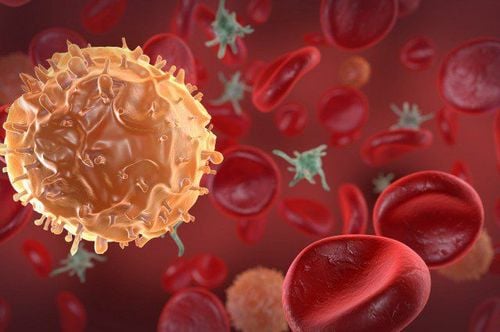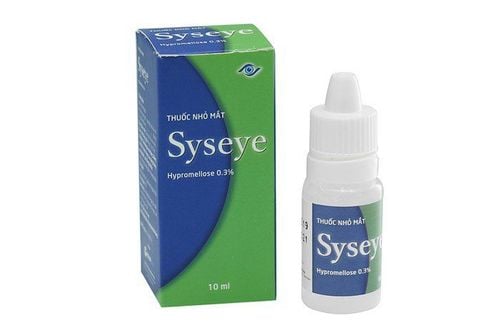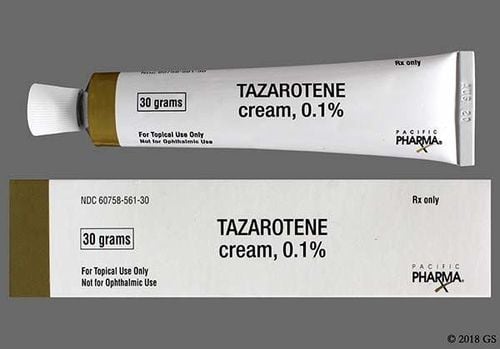This is an automatically translated article.
Vitamin A is the general term for a group of fat-soluble compounds that are important to human health. Vitamin A helps maintain healthy vision, ensures the normal function of the immune system and organs, and supports the proper growth and development of a baby in the womb.
Here are 6 important health benefits of vitamin A.
1. Protect your eyes against night blindness and vision loss caused by aging
Vitamin A is essential for vision protection, as this vitamin converts light entering the eye into electrical signals that are transmitted to the brain.In fact, one of the first symptoms of vitamin A deficiency can be night blindness, as the vitamin is a major component of the pigment Rhodopsin. Rhodopsin is found in the retina of the eye and is extremely sensitive to light. People with this condition can still see normally during the day, but their vision in the dark is reduced as their eyes have to work hard to adjust to lower levels of light.
Not only does it help prevent night blindness, getting enough beta carotene (beta carotene, also known as provitamin A, a precursor to vitamin A synthesis) can help slow the decline in vision that some people experience. right with age.
2. Vitamin A helps reduce the risk of some cancers
Cancer occurs when abnormal cells begin to grow or divide in an uncontrolled way.
In observational studies, eating more vitamin A in the form of beta-carotene has been associated with a reduced risk of several types of cancer, including: Hodgkin's lymphoma, cervical, lung, and bladder cancers .
Currently, the relationship between vitamin A levels in your body and cancer risk is not fully understood. However, current evidence suggests that getting enough vitamin A, especially from plants, is important for healthy cell division and may reduce the risk of certain types of cancer.

Vitamin A giúp giảm nguy cơ mắc một số bệnh ung thư
3. Vitamin A Supports a Healthy Immune System
Vitamin A plays an important role in maintaining the body's natural defenses. This benefit of vitamin A manifests itself in the mucus barriers in your eyes, lungs, intestines, and genitals that help trap bacteria and other infectious agents. It is also involved in the production and function of white blood cells, which capture and remove bacteria, as well as other pathogens, from the blood. This means that a vitamin A deficiency can increase the likelihood of infection and delay the recovery of resistance to illness.
4. Vitamin A reduces the risk of acne
Acne is a chronic disease of the skin. These pimples appear when the sebaceous glands become blocked by dead skin or excess oil build up. While these pimples are physically harmless, they can have an aesthetic effect. It is more likely that one of the causes of acne is a lack of vitamin A. Adequate vitamin A intake will help strengthen skin and reduce the risk of acne.
5. Vitamin A Supports Bone Health
People with low blood levels of vitamin A have a higher risk of bone fractures than people with normal vitamin A levels.
However, if a person has too much vitamin A, there is also a higher risk of fracture. This means that for now, the link between vitamin A and bone health requires more controlled trials to confirm it more precisely.
6. Vitamin A promotes healthy growth and fertility
Vitamin A is essential for maintaining a healthy reproductive system in both men and women, and for ensuring the normal growth and development of the embryo during pregnancy.
Studies in rats examining the importance of vitamin A in male reproduction have shown that vitamin A deficiency suppresses the growth of sperm cells, causing infertility.
Likewise, animal studies suggest that vitamin A deficiency in females can affect reproduction by reducing egg quality and affecting egg attachment to the uterine wall.
In pregnant women, vitamin A is also involved in the growth and development of many major organs and structures of the fetus, including: skeletal system, nervous system, heart, kidneys, eyes, lungs and glands pancreas. But too much vitamin A during pregnancy can also harm a developing baby and can lead to birth defects. As a result, many health authorities recommend that women avoid foods that contain excessive amounts of vitamin A, such as pate and liver, as well as supplements containing vitamin A during pregnancy.

Vitamin A có nhiều lợi ích trong vấn đề sinh sản
Vitamin A is a fat-soluble vitamin that is stored in the body. However, excessive consumption can lead to toxic levels. Symptoms can include nausea, dizziness, headaches, pain, and even death. The best way to make sure we get the right balance is to consume foods rich in vitamin A as part of a normal diet and avoid taking too much.
Please dial HOTLINE for more information or register for an appointment HERE. Download MyVinmec app to make appointments faster and to manage your bookings easily.
Reference source: healthline.com












